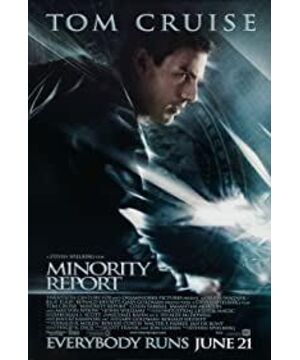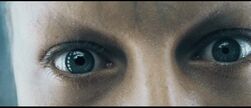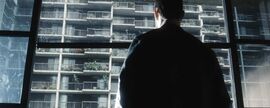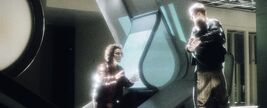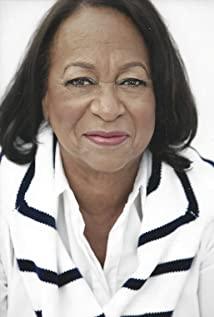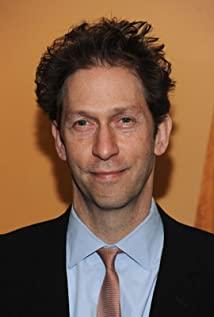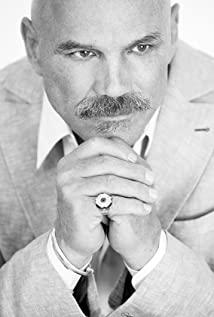"Minority Report" gave me a terrifying experience when watching movies, especially the sci-fi part. The future imagined in 2002 seemed out of reach, but in fact it was only the progress of material civilization. The idea of the film is a political metaphor based on human rights, rationality and transcendence. Below I analyze this film from three aspects. First, whether the existence of a prophet can predict the occurrence of sin. the answer is negative. In medieval Europe, an omniscient, almighty and all-good God was preached, but people quickly discovered that since God is all-knowing, all-powerful and all-good, where does evil come from? In order to solve this logical paradox, Christians look for the answer from the Bible. The reason Adam and Eve ate the forbidden fruit and were driven out of the Garden of Eden, so mankind began to wander, and the result of this behavior was to make mankind have original sin. The Son of God was nailed to the cross in order to save mankind. This logic also follows. Just like Xunzi's "Sexual Evil Theory", human beings have a dark side. In order to prevent others from harming me for their own interests, we need to establish a violent mechanism to deter the perpetrators. This is the theoretical logic of the existence of prophetic institutions in the film. But this institution is clearly beyond the confines of this theory, and the reason is the presence of the Prophet. In the existence of prophets, people no longer have the ability to think rationally, but are only the executors of the decisions of the prophets. The point is that the existence of this a priori does not prove that all the decisions it makes are flawless, just like all swans we have seen are white, nor does it prove that all swans are white, the same the truth. This is also confirmed at the end of the movie, and there are times when the prophets make the wrong decisions. The disagreement between the man who created the agency (the old man) and the operations captain who carried out the Prophet's decisions is what drives the film. We can compare the builder of the institution to the manipulator who strictly formulates and implements the plan (because the so-called prophet is also the perfect person created by him), and the executor of the decision as the support of the laissez-faire market economy. (of course this is after discovering that he may be a victim of planning), the democratic politician who sets out to plan economic life is soon faced with the choice of assuming dictatorial power or abandoning his plan, and a totalitarian dictator will soon have to Will you choose between general moral disregard and failure? Like the old man who would risk the lives of others in order to make the prophet's existence so persuasive? When I read "The Road to Serfdom", I had a strong sense of substitution. This is the value of the film. It makes profound and incomprehensible or even obscure theories explain theories through dramatic expressions, not only fully expressing a certain point of view , and more Make it easy to understand. The second thing that impressed me most was the change in the role of the male protagonist. Stage 1: As the executor of decision-making, he is upright, and he even pursues preventing crimes from happening. The reason is that his innocent son was innocently killed. He believes that as a father, there is nothing more pitiful than losing his own child. . The portrayal of the protagonist's image is very clear here. That is, the beneficiary groups of the existing system. There is an era when the lens is more impressive, full of blind people, and the one-eyed person is enough to be king. This also echoes the cover of the film. And when the male protagonist was running, he thanked the propaganda film for the existence of the Prophet Agency along the way. They're all saying, what would be catastrophic consequences without this institution, and where would those consequences come from? Certainly propaganda of the prophetic institution. So, to interject here, nothing is unavoidable, what makes it unavoidable is thought. Isn't it sad when we come up with an idea that we think is of free will, but is actually implanted by someone else, an organization, or a propaganda agency? By the way, how did the male protagonist switch roles? It's through man-made prophets, and then realizing there's a loophole in the prophet's system that creates a series of problems, such as seeing yourself as an arrested person. At this time, as a staunch supporter of this system, he became a victim of enslavement by this system. (The premise is that the male protagonist does not admit that the prediction made by the prophet is correct.) The change of roles implies that only when we become the beneficiaries of a certain system, can we possibly support all decisions made by this system , and vice versa. As a person in the system, the male protagonist can keenly perceive the loopholes contained in the prophet system, but if his interests are not damaged, what will he do? it goes without saying. Third, can we have freedom from repression? The existence of prophets was accidental, and they were used as experiments without limit, without considering that they were also human beings, and human beings were an end, not a tool to achieve a certain end. In the Western world, which has always advocated human rights, it is simply unimaginable that such a scenario exists. Judgment of crime, however accurate it may be, can hardly conceal its infinite involvement in personal life. Legally speaking is the presumption of innocence, and here is the presumption of guilt, and there is no defense and no defense. When faced with a threat, it is normal for us to have a certain evil thought, and it is obviously not convincing to use this as the basis for conviction. The reason for the pursuit of life is that his innocent son was killed innocently, and he believes that as a father, there is nothing more pitiful than losing his own child. The portrayal of the protagonist's image is very clear here. That is, the beneficiary groups of the existing system. There is an era when the lens is more impressive, full of blind people, and the one-eyed person is enough to be king. This also echoes the cover of the film. And when the male protagonist was running, he thanked the propaganda film for the existence of the Prophet Agency along the way. They're all saying, what would be catastrophic consequences without this institution, and where would those consequences come from? Certainly propaganda of the prophetic institution. So, to interject here, nothing is unavoidable, what makes it unavoidable is thought. Isn't it sad when we come up with an idea that we think is of free will, but is actually implanted by someone else, an organization, or a propaganda agency? By the way, how did the male protagonist switch roles? It's through man-made prophets, and then realizing there's a loophole in the prophet's system that creates a series of problems, such as seeing yourself as an arrested person. At this time, as a staunch supporter of this system, he became a victim of enslavement by this system. (The premise is that the male protagonist does not admit that the prediction made by the prophet is correct.) The change of roles implies that only when we become the beneficiaries of a certain system, can we possibly support all decisions made by this system , and vice versa. As a person in the system, the male protagonist can keenly perceive the loopholes contained in the prophet system, but if his interests are not damaged, what will he do? it goes without saying. Third, can we have freedom from repression? The existence of prophets was accidental, and they were used as experiments without limit, without considering that they were also human beings, and human beings were an end, not a tool to achieve a certain end. In the Western world, which has always advocated human rights, it is simply unimaginable that such a scenario exists. Judgment of crime, however accurate it may be, can hardly conceal its infinite involvement in personal life. Legally speaking is the presumption of innocence, and here is the presumption of guilt, and there is no defense and no defense. When faced with a threat, it is normal for us to have a certain evil thought, and it is obviously not convincing to use this as the basis for conviction. The reason for the pursuit of life is that his innocent son was killed innocently, and he believes that as a father, there is nothing more pitiful than losing his own child. The portrayal of the protagonist's image is very clear here. That is, the beneficiary groups of the existing system. There is an era when the lens is more impressive, full of blind people, and the one-eyed person is enough to be king. This also echoes the cover of the film. And when the male protagonist was running, he thanked the propaganda film for the existence of the Prophet Agency along the way. They're all saying, what would be catastrophic consequences without this institution, and where would those consequences come from? Certainly propaganda of the prophetic institution. So, to interject here, nothing is unavoidable, what makes it unavoidable is thought. Isn't it sad when we come up with an idea that we think is of free will, but is actually implanted by someone else, an organization, or a propaganda agency? By the way, how did the male protagonist switch roles? It's through man-made prophets, and then realizing there's a loophole in the prophet's system that creates a series of problems, such as seeing yourself as an arrested person. At this time, as a staunch supporter of this system, he became a victim of enslavement by this system. (The premise is that the male protagonist does not admit that the prediction made by the prophet is correct.) The change of roles implies that only when we become the beneficiaries of a certain system, can we possibly support all decisions made by this system , and vice versa. As a person in the system, the male protagonist can keenly perceive the loopholes contained in the prophet system, but if his interests are not damaged, what will he do? it goes without saying. Third, can we have freedom from repression? The existence of prophets was accidental, and they were used as experiments without limit, without considering that they were also human beings, and human beings were an end, not a tool to achieve a certain end. In the Western world, which has always advocated human rights, it is simply unimaginable that such a scenario exists. Judgment of crime, however accurate it may be, can hardly conceal its infinite involvement in personal life. Legally speaking is the presumption of innocence, and here is the presumption of guilt, and there is no defense and no defense. When faced with a threat, it is normal for us to have a certain evil thought, and it is obviously not convincing to use this as the basis for conviction. While the Lord was running, there were propaganda videos thanking the existence of the prophetic agency. They're all saying, what would be catastrophic consequences without this institution, and where would those consequences come from? Certainly propaganda of the prophetic institution. So, to interject here, nothing is unavoidable, what makes it unavoidable is thought. Isn't it sad when we come up with an idea that we think is of free will, but is actually implanted by someone else, an organization, or a propaganda agency? By the way, how did the male protagonist switch roles? It's through man-made prophets, and then realizing there's a loophole in the prophet's system that creates a series of problems, such as seeing yourself as an arrested person. At this time, as a staunch supporter of this system, he became a victim of enslavement by this system. (The premise is that the male protagonist does not admit that the prediction made by the prophet is correct.) The change of roles implies that only when we become the beneficiaries of a certain system, can we possibly support all decisions made by this system , and vice versa. As a person in the system, the male protagonist can keenly perceive the loopholes contained in the prophet system, but if his interests are not damaged, what will he do? it goes without saying. Third, can we have freedom from repression? The existence of prophets was accidental, and they were used as experiments without limit, without considering that they were also human beings, and human beings were an end, not a tool to achieve a certain end. In the Western world, which has always advocated human rights, it is simply unimaginable that such a scenario exists. Judgment of crime, however accurate it may be, can hardly conceal its infinite involvement in personal life. Legally speaking is the presumption of innocence, and here is the presumption of guilt, and there is no defense and no defense. When faced with a threat, it is normal for us to have a certain evil thought, and it is obviously not convincing to use this as the basis for conviction. While the Lord was running, there were propaganda videos thanking the existence of the prophetic agency. They're all saying, what would be catastrophic consequences without this institution, and where would those consequences come from? Certainly propaganda of the prophetic institution. So, to interject here, nothing is unavoidable, what makes it unavoidable is thought. Isn't it sad when we come up with an idea that we think is of free will, but is actually implanted by someone else, an organization, or a propaganda agency? By the way, how did the male protagonist switch roles? It's through man-made prophets, and then realizing there's a loophole in the prophet's system that creates a series of problems, such as seeing yourself as an arrested person. At this time, as a staunch supporter of this system, he became a victim of enslavement by this system. (The premise is that the male protagonist does not admit that the prediction made by the prophet is correct.) The change of roles implies that only when we become the beneficiaries of a certain system, can we possibly support all decisions made by this system , and vice versa. As a person in the system, the male protagonist can keenly perceive the loopholes contained in the prophet system, but if his interests are not damaged, what will he do? it goes without saying. Third, can we have freedom from repression? The existence of prophets was accidental, and they were used as experiments without limit, without considering that they were also human beings, and human beings were an end, not a tool to achieve a certain end. In the Western world, which has always advocated human rights, it is simply unimaginable that such a scenario exists. Judgment of crime, however accurate it may be, can hardly conceal its infinite involvement in personal life. Legally speaking is the presumption of innocence, and here is the presumption of guilt, and there is no defense and no defense. When faced with a threat, it is normal for us to have a certain evil thought, and it is obviously not convincing to use this as the basis for conviction. Victims of a system of slavery. (The premise is that the male protagonist does not admit that the prediction made by the prophet is correct.) The change of roles implies that only when we become the beneficiaries of a certain system, can we possibly support all decisions made by this system , and vice versa. As a person in the system, the male protagonist can keenly perceive the loopholes contained in the prophet system, but if his interests are not damaged, what will he do? it goes without saying. Third, can we have freedom from repression? The existence of prophets was accidental, and they were used as experiments without limit, without considering that they were also human beings, and human beings were an end, not a tool to achieve a certain end. In the Western world, which has always advocated human rights, it is simply unimaginable that such a scenario exists. Judgment of crime, however accurate it may be, can hardly conceal its infinite involvement in personal life. Legally speaking is the presumption of innocence, and here is the presumption of guilt, and there is no defense and no defense. When faced with a threat, it is normal for us to have a certain evil thought, and it is obviously not convincing to use this as the basis for conviction. Victims of a system of slavery. (The premise is that the male protagonist does not admit that the prediction made by the prophet is correct.) The change of roles implies that only when we become the beneficiaries of a certain system, can we possibly support all decisions made by this system , and vice versa. As a person in the system, the male protagonist can keenly perceive the loopholes contained in the prophet system, but if his interests are not damaged, what will he do? it goes without saying. Third, can we have freedom from repression? The existence of prophets was accidental, and they were used as experiments without limit, without considering that they were also human beings, and human beings were an end, not a tool to achieve a certain end. In the Western world, which has always advocated human rights, it is simply unimaginable that such a scenario exists. Judgment of crime, however accurate it may be, can hardly conceal its infinite involvement in personal life. Legally speaking is the presumption of innocence, and here is the presumption of guilt, and there is no defense and no defense. When faced with a threat, it is normal for us to have a certain evil thought, and it is obviously not convincing to use this as the basis for conviction.
View more about Minority Report reviews


